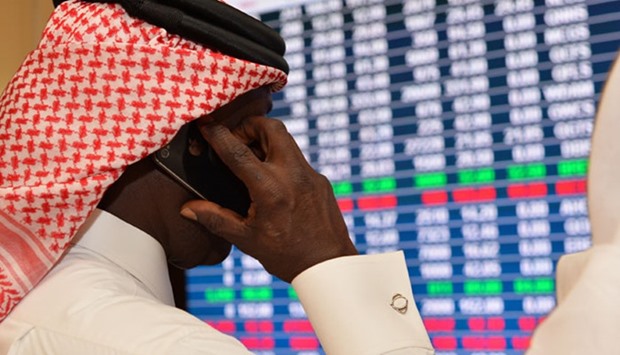Qatar Stock Exchange on Tuesday witnessed stronger buying interests – especially in the consumer goods and transport stocks – but translated as a marginal 16 points addition, thus failing to break the 9,900 resistance levels.
Local retail investors were increasingly into buying and Gulf institutions turned bullish to lift the 20-stock Qatar Index 0.16% for the third consecutive day to 9,873.13 points despite global oil price spurting on reports that four oil producers decided to limit the production at January levels, provided other producers cooperate.
However, buying interests of foreign institutions weakened considerably and there was marginal increase in net profit booking by their domestic counterparts in the market, where trading turnover and volumes were on the rise.
Mid and large cap equities witnessed some brisk buying in the bourse, which is however down 5.33% year-to-date.
Gulf individual investors turned bearish and their non-Qatari counterparts’ net buying was seen weakening in the market, where consumer goods, real estate, industrials and banking stocks together accounted for more than 88% of the total trading volume.
Market capitalisation rose 0.33% or about QR2bn to QR525.27bn with mid and large cap stocks gaining 1.18% and 0.34%; whereas small and micro caps fell 0.43% and 0.19% respectively.
The Total Return Index was up 0.16% to 15,398.14 points and All Share Index by 0.36% to 2,636.95 points, while Al Rayan Islamic Index was down 0.02% to 3,536.39 points.
Consumer goods stocks surged 4.09%, transport (1.26%), insurance (0.52%), and banks and financial services and realty (0.18% each); whereas telecom and industrials fell 0.92% and 0.12% respectively.
Major movers included Barwa, Woqod, Salam International Investment, Mazaya Qatar, Milaha, Qatar Islamic Bank, Doha Bank, Masraf Al Rayan, Alijarah Holding, Industries Qatar, Qatari Investors Group, Gulf International Services, Mesaieed Petrochemical Holding and Nakilat; even as Aamal Company, United Development Company, Ooredoo, Ezdan, QNB and Commercial Bank bucked the trend.
The GCC (Gulf Cooperation Council) institutions turned net buyers to the tune of QR15.1mn against net sellers of QR6.5mn on Monday.
Local retail investors’ net buying strengthened to QR9.09mn compared to QR0.49mn the previous day.
However, non-Qatari institutions’ net buying plunged to QR18.45mn against QR37.59mn on February 15.
The GCC individuals turned net sellers to the extent of QR4.66mn compared with net buyers of QR0.85mn on Monday.
Non-Qatari individual investors’ net buying declined to QR0.92mn against QR4.1mn the previous day.
Domestic institutions’ net profit booking increased to QR38.94mn compared to QR36.52mn on February 15.
Total trade volume rose 70% to 14.21mn shares, value by 27% to QR385.17mn and deals by 16% to 5,694.
The consumer goods sector’s trade volume grew more than eight-fold to 4.96mn equities and value more than doubled to QR104.2mn on more than doubled transactions to 1,443.
The insurance sector’s trade volume more than doubled to 0.23mn stocks, value soared 23% to QR9.01mn and deals by 51% to 110.
The telecom sector saw 38% surge in trade volume to 0.55mn shares but on 14% fall in value to QR8.89mn and 8% in transactions to 292.
The banks and financial services sector’s trade volume expanded 28% to 2.13mn equities and value by 9% to QR77.13mn, while deals fell 13% to 901.
The industrials sector reported 27% jump in trade volume to 2.29mn stocks, 21% in value to QR91.72mn and 7% in transactions to 1,521.
The transport sector’s trade volume grew 22% to 0.9mn shares and value by 8% to QR25.08mn, whereas deals were down 3% to 317.
The real estate sector’s trade volume was up 3% to 3.14mn equities, while there was 2% fall in value to QR69.14mn and 2% in transactions to 1,110.
In the debt market, there was no trading of treasury bills and government bonds.

Mid and large cap equities witnessed some brisk buying in the bourse.
